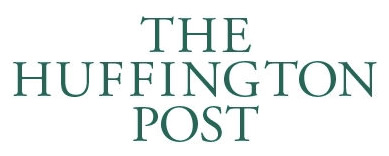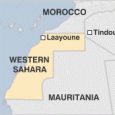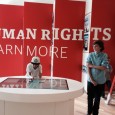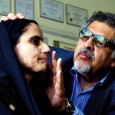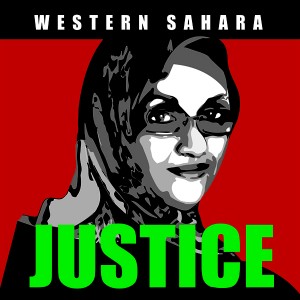
Image by Matthew DeMaio
Say the words “hunger strike” and many will recall images of an emaciated Mahatma Gandhi enduring several famous fasts to protest British rule of India.
But most Americans are currently unaware of an ailing human rights campaigner from Western Sahara now in the third week of a risky hunger strike after being expelled from her occupied homeland by Moroccan authorities.
A month ago, I had the good fortune of spending a week at the side of the often called “Sahrawi Gandhi,” Aminatou Haidar. Aminatou and I share many things: we’re both 42, we’re both mothers of two young children, we laugh at the same stories, and we both love the shrimp dish at our hideaway DuPont Circle restaurant. We are, as Aminatou says, like sisters.
And while we both call ourselves human rights activists, our day to day work is conditioned entirely by our life experiences. A product of the U.S., my brand of human rights activism is all but removed from the day to day horrors of abusive regimes. I develop strategic campaigns for human rights organizations and advocates like Aminatou, making sure their issues are heard in the media and in the corridors of Capitol Hill.
Aminatou, on the other hand, is in the thick of it. For over twenty years, she has led the nonviolent struggle to free the people of Western Sahara from Morocco’s 34-year occupation. In 1988, both parties agreed to settle the dispute through a UN-administered referendum that would allow the people of Western Sahara to choose between independence or integration with Morocco. The vote still has not been held, and UN facilitated peace talks have stalled over disagreements, including who qualifies to participate in the potential referendum.
During this time, Aminatou has spent nearly five years in prison for her peaceful activism, much of it in solitary confinement undergoing repeated torture. I have seen the pictures of Aminatou bloodied and scarred.
As I write this on my laptop in a coffee shop in New York, Aminatou is lying back against cushions on the floor of a waiting area in Lanzarote airport, in Spain’s Canary Islands, fading in and out of wakefulness.
I am writing because Aminatou’s life is literally in peril, and this keyboard is, frustratingly, one of my only tools to bring attention to my colleague and friend.
The details of her circumstance are straightforward. After Aminatou’s visit to the U.S. to receive the 2009 Civil Courage Prize from the Train Foundation, she boarded a connecting flight in the Canary Islands to return home to her family in Laayoune, the main city in the Moroccan occupied zone of Western Sahara. As she had many times before, she declared Western Sahara as her country of origin on the immigration entry form. This time, though, Moroccan authorities seized her Moroccan passport (Morocco administers all travel documents for Western Saharans), held her for interrogation, and — claiming she had renounced her Moroccan citizenship — summarily deported her to the Canary Islands. Spain allowed her entry against her will and without travel documents, but insisted she could not travel back to Laayoune because she had no passport.
It is a direct violation of the International Covenant on Civil and Political Rights, signed by Morocco in 1979, for anyone to be arbitrarily deprived of the right to enter his or her own country. According to a statement by the New York City Bar, this amounts to a breach of Morocco’s international law obligations.
Now Aminatou is, in effect, stateless. She has refused an offer of a Spanish passport, insisting that she will not be a “foreigner in her own country.” The Moroccan Government refuses to reinstate her passport until she publicly apologizes for her “act of treason.”
Hunger strikes are last resorts, never to be taken casually – particularly if you have a perforated ulcer and the other residual maladies Aminatou carries with her as a result of the years of beatings. According to Wikipedia, after three weeks of non-stop fasting, the body enters into “starvation mode,” at which point the body mines the muscles and vital organs for energy, and loss of bone marrow becomes life-threatening.
Aminatou is prepared to take this hunger strike “to the death.” When I last managed to reach her by cell phone, she told me that her body was failing, but her will was as strong as ever. Mostly, she was preoccupied with the well-being of her children.
Pressure has mounted on Spain to resolve the situation, and Aminatou’s plight has ignited the attention of the media there. Filmmaker Pedro Almodóvar has led protests in her name and the actor Guillermo “Willie” Toledo has set up a makeshift office in the airport to be near her.
By stalling in this crisis, Morocco’s standing in the international community is called into question. The situation clearly undermines the ongoing negotiations between Morocco and Western Sahara mediated by U.N. Special Envoy Christopher Ross. And many policy watchers have begun to ask how the U.S. should relate to a solid ally whose human rights record is better than the norm in the region, but is now heading in the wrong direction.
This week Senator Patrick Leahy called the situation “unacceptable” and urged President Obama to defend those whose fundamental rights are denied, wherever it occurs. Senator Russ Feingold and Representative Donald Payne, chairmen of the Senate and House Subcommittees on Africa, also expressed deep concern.
Hanging on the wall of my office is a quote from Archbishop Desmond Tutu which reads, “If you are neutral in situations of injustice, you have chosen the side of the oppressor.”
Remaining silent or ambiguous for fear of damaging our long-standing relations with Morocco is simply unconscionable. It is urgent for the United States to help resolve this situation by asking Morocco to return Aminatou’s passport and allow her to return to her family. We must be firm in asking Spain to intercede with Morocco to ensure her safe return. It is also time for the U.S. to use its influence in the United Nations to reaffirm support for the negotiations and the long-overdue referendum on self-determination for the people of Western Sahara. U.S. citizens should express their concern to their elected officials, as well as signing an open letter to the United Nations High Commissioner for Human Rights.
People like Aminatou capture our imaginations and give us hope that the path to peace — wherever it may be — is achievable through non-violent measures. Simply put, we must ensure that one of the world’s rare role models lives to carry out her life’s mission surrounded by her family and her people.
Barbara Becker is principal of EqualShot. The views expressed in this piece are solely her own and are, in no way, meant to reflect the opinions of her clients.
